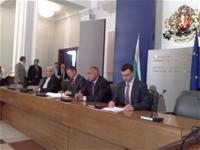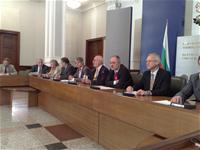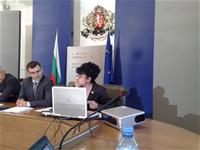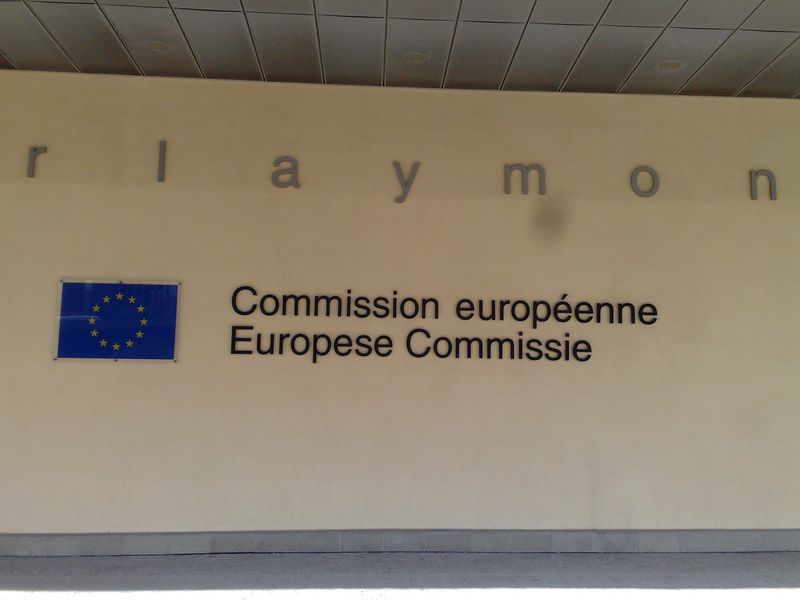Boyko Borissov: Brussels will not be anrgy about the deficit. What about us?
Adelina Marini, May 10, 2010
 What is the budget? First of all it is a law. Secondly, this is the law regulating revenues and spending, the way taxpayer's money is being managed by the government, sealed and approved by the National Assembly. To put it simply - the budget is a commitment and a responsibility. If you have made a bad budget, you will have to find a way to deal with it even if it would mean losing popularity. Because changes in the budget are being made only if it is extremely necessary and this is usually in times of external or internal cataclysms.
What is the budget? First of all it is a law. Secondly, this is the law regulating revenues and spending, the way taxpayer's money is being managed by the government, sealed and approved by the National Assembly. To put it simply - the budget is a commitment and a responsibility. If you have made a bad budget, you will have to find a way to deal with it even if it would mean losing popularity. Because changes in the budget are being made only if it is extremely necessary and this is usually in times of external or internal cataclysms.
So, when the prime minister states that "we are not a planning economy (the way it used to be during communism), so we will review the budget as many times as necessary", this causes not just bewilderment but concern too. Because this would mean that each time when you see that a law is not written the way it should be, you could change it as many times as you like only to fit the momentary benefits of a person, group of people or interests. And we can freely call this a true lawlessness.
But, let us start in the order of events because the news is so important that it needs a thorough and arranged telling.
Day Monday, May 3
The prime minister gives a telephone interview for a not very popular business TV EBF, where since recently a very popular journalist has been working - Milen Tsvetkov. In his interview the premier, as it seemed - by the way mentioned a news with national importance - we will be making a review of the budget. This is happening in the beginning of May - only a month after the government has approved a package of 60 anti crisis measures and against the background of bad data for the implementation of the budget for the first 3 months.
And the thirst for information about what the government is planning to do with the enormous fiscal deficit of over 1 bn and 600 mn levs (820 mn euro), is being quenched with the following explanation by the prime minister: "I gave myself a deadline to listen, read and watch for one or two weeks all the interpretations of many sides. This is why now I am convinced that it was not an accident that the most active part of the population voted for us!" I am not sure what Mr Borissov wanted to tell me with this. I could have understood him better if he had used the national TV, being maintained thanks to my taxes, to tell me: "Dear citizens, we were wrong! We wrote a too optimistic budget (something of which many economic analysts warned in the end of last year), and now our estimations appeared to be wrong. We have to change the budget and we rely on your understanding!"
Day Tuesday, May 4
euinside's team had already learnt about the news from the above mentioned interview for the EBF TV, but we are not sure. We listened the entire interview over and over again, discussed it but decided to wait and see - at least one of the big media (national, regional, a newspaper or radio) might announce this as a lead because this is a breaking news! But no. Instead we are being entertained with the deputy prime minister Tsvetan Tsvetanov's rating. So we decided to wait for the Council of Ministers to send the agenda for their Wednesday's meeting where probably the discussion of this important news must be included if not as a first point in the agenda at least be in the agenda. No, no and no!
Day Wednesday, May 5 (the last working day before another too long and useless vacation)
The technical personnel in the Council of Ministers building is in a rush to install the equipment for multimedia presentations and this is how we understood that the minister of healthcare would announce its plans for a healthcare reform! What a shock! When has she become a minister, when at the crossroad near Veliko Tarnovo (this is where the prime minister announced he met the new minister) did she manage to make a thorough analysis of the entire healthcare system, to find its strong and weak sides, and finally when did she manage to prepare a vision for a reform? And not just a reform but a structural one!
At least, we said, even if this story with the budget review could appear as a mistake, it was worth staying to see what kind of a healthcare reform this would be. For years our European partners, institutions, the World Bank, the IMF, foreign experts, our experts have insisted for a healthcare reform.
In the press conference hall at the Council of Ministers a group, headed by the  minister of labour and social policy Totyu Mladenov rushes in. They are some of the members of the National Trilateral Cooperation Council (NTCC). They had agreed about the sick-leave. Two of them mention in a certain context that a review of the budget was being discussed. Only then among the colleagues the news about the review starts spreading - wow - review, review, what are we going to do! The group leaves after it became clear there were no questions for its members.
minister of labour and social policy Totyu Mladenov rushes in. They are some of the members of the National Trilateral Cooperation Council (NTCC). They had agreed about the sick-leave. Two of them mention in a certain context that a review of the budget was being discussed. Only then among the colleagues the news about the review starts spreading - wow - review, review, what are we going to do! The group leaves after it became clear there were no questions for its members.
At last, after a long (for the understanding of this government) session, a little after noon the prime minister arrives, followed closely by several of his ministers. In a tight military-looking style Mr Boyko Borissov explained the rules: each minister will present briefly the reforms, agreed at the government's session, the agenda of which was very much different. All journalists, responsible for the various topics will bot be able to ask questions - they should organise a press conference of their own and ask there as much as they like. Let me say it again - we are talking about reforms, fundamental, structural reforms and questions are not allowed because there is no time!
First is the minister of education who announces that next week (this week) a draft amending the Law for the Bulgarian Academy of Science will be introduced. "A serous structural reform is to be realised", Sergey Ignatov adds but from his explanations the filling of "structural" is escaping to me: scientific institutes will be detached from the Academy and will become independent, autonomous, national research institutes. They will be financed directly by the state budget. All scientists will keep their jobs, all teams that have already been built and work together will be kept and will not be united. The Academy itself will continue to be supported by the state, the properties of the institutes will remain state ones. There will be a guaranteed state support for research. Scientific incubators will be established in 3 or 4 Bulgarian universities.
By the end of the year we will have a brand new Law for High Education, which foresees separation of academic management from financial-economic management. "These are reforms that have to happen this year", the minister explained. But what results are we expecting from these reforms he did not say. Nor he mentioned how are these reforms related to the revenues and spending in the budget or how much the reforms would cost.
Next is the minister of defence Anyu Anghelov. He makes a short report of how much the ministry has saved, how much people have been laid off (all small numbers). He explains that the more important part of the review of the structure of the army is to be made. This stage will end by in August and in September a White paper will be published. Great! Weren't all reforms to be realised this year, because the budget has a gap this year? No answer, all journalists that are interested can go and ask if there is anybody to answer them.
Without wasting any more time the word takes Totyu Mladenov, a minister of labour and social policy who reports: "11.3% of GDP will be spent for pensions this year. 43% of the budgetary spending go for pensions and social spending. 60% of all spending of the National Securities Institute for pensions and other compensations are being paid by the state budget and only 40% are collected from social security contributions". And he announces another important reform - pension reform! Finally, we say to each other, at last they got it that without such a reform this year's budget will look like a feast compared to the future.
And here is the essence of the reform: an increase of the length of service for pensions by 3 years both for men and women; restriction of early retirement; tightening of the access to pensions in general; making the order for proving labour disability more precise and transfering leading powers to pensions bodies. The minister enumerated many other measures all in the same spirit by separating them into two groups: measures that enter into force as of January 1, 2011 and measures entering into force as of July 1, 2011. A curious detail is that the minister based his reform on the Lisbon Strategy for Growth and Jobs, whose "expiry date" is 2010 and currently the next 10-year economic strategy of the Union is being discussed, called Europe 2020.
And again, all curious journalists are supposed to run after the minister. We are now staring at the new minister of healthcare Anna-Maria Borissova who is already speaking. What makes a strong impression is that her team consists of very young people, dressed as if for a ball at the queen's palace, but these are just details. No one has time to learn the dress code in a time of reforms! In the very beginning of her presentation doctor Borissova caused bewilderment:
 "Here at your attention I present a graphics, showing us what the situation is - to the left is Europe and to the right - Bulgaria - the situation of healthcare in Europe and Bulgaria and you will very easily understand what in fact we are going to do. You see that in Bulgaria we spend 47%, meaning almost a half, for hospitals while in Europe - only 27%. In the same time Europe spends around 12% in hospitals for additional and continuous treatment while we have nothing similar to that. What are we going to do in fact? Studying what the current situation is, today of our hospital system, we will recognise which hospitals are appropriate to be transformed from hospitals for active treatment to hospitals for additional or continuous treatment.
"Here at your attention I present a graphics, showing us what the situation is - to the left is Europe and to the right - Bulgaria - the situation of healthcare in Europe and Bulgaria and you will very easily understand what in fact we are going to do. You see that in Bulgaria we spend 47%, meaning almost a half, for hospitals while in Europe - only 27%. In the same time Europe spends around 12% in hospitals for additional and continuous treatment while we have nothing similar to that. What are we going to do in fact? Studying what the current situation is, today of our hospital system, we will recognise which hospitals are appropriate to be transformed from hospitals for active treatment to hospitals for additional or continuous treatment.
Actually this is a simple scheme, which I think you all understand and I have always, when appearing before you, stated that no doctor or a nurse would remain without a job. We will not close hospitals! We will just transform them. Simply, Bulgaria's healthcare system will copy the healthcare system that is well established and works well in Europe! This is what we are going to do".
What caused my bewilderment? The fact that the minister is making a comparison with something as abstract as "Europe" - which Europe, which EU member states, is this an average model? How much will this cost, where will the money come from, given the fact that you are not making any lay-offs, what results should we expect? The journalists have to find their ways.
It is the deputy prime minister and minister of finance Simeon Dyankov's turn. At last we will hear more details about the budget review. But he disappoints in the very beginning because he only explained that on the main economic parameters the prime minister will talk.
And here it starts getting interesting from here, in case you found the above boring. After a long and continuous tirade we understand that the review is in the direction of more spending. There will be 116 mn levs (59.48 mn euro) for tobacco producers in order to prevent them from starving to death. "If we do not include this 116 mn levs in the budget, it's true that the deficit will increase in the end of the year, but what can we do with these people since they have nothing to live with. If any of you has visited these regions knows well that they can't do anything else. Unfortunately, so far no one has offered me an alternative. If we do not include this money, we doom these people to death".
Well, my heart is not made of steel but, if things are put that way, Mr Prime Minister, you should have included this 116 mn levs with e precondition - alright, this year these people cannot plant roses instead of tobacco but then prepare the grounds for next year because taxpayers would not agree to spend any more money for tobacco producers, especially those who do not smoke! But no, our prime minister is a philanthropist and we cannot tell him what to do.
"220 mn levs (112.82 mn euro) we will unblock for the National Healthcare  Fund in parallel with the reform in healthcare and I am convinced that by the end of the year they will save Me the same amount of money because this disgrace in payments in the healthcare system is such that I am convinced that this team of minister Borissova will save Me the money afterwords". You read about the reform, so you can see whether this money can be returned or, more precisely - to be returned to Him.
Fund in parallel with the reform in healthcare and I am convinced that by the end of the year they will save Me the same amount of money because this disgrace in payments in the healthcare system is such that I am convinced that this team of minister Borissova will save Me the money afterwords". You read about the reform, so you can see whether this money can be returned or, more precisely - to be returned to Him.
"148 mn (75.89 mn euro) will go for social assistance + 10 mn for employment. These are measures, this is money which will go to the people that are in extreme need, the people that are put in this dire situation for different reasons and people whom we want to help survive the crisis". Who are these very needing people, is there any analysis why are they put in this "dire" situation, is the state to blame, is they to blame, is it the educational system, is there no jobs or they cannot work? A tsunami of questions but without answers.
Then more millions follow - for tourism, transport, infrastructure, helicopters, bridges, northern tangents, southern roundabout roads, junctions, border control - all things for which the prime minister stated:
"In other words we will here increase the deficit, but this money will directly go into the economy, people will feel it directly. And through the debt emissions we will be able to stabilize the board (the currency board) in order to ensure that this bigger deficit is not dangerous for the stability of the national currency (the lev). + 20% savings + the rest of the measures that we propose and I think that foreign markets, the foreign observers will be calm for what our government is doing. I am convinced that when you have such a clear, specific and know-what-the-money-goes-for plan, they know very well that for 20 years a lot of money has been poured in infrastructure with no effect".
And the deputy prime minister Dyankov explained that the structural deficit will remain unchanged "because it was not an accident that we enumerated these reforms which will be realised from now till the end of the year and some of them will be enforced from the beginning or the middle of next year. The European Union is only interested in the structural deficit and with these reforms which will help in the future for the stability, the additional spending is not included in the structural deficit. All this additional spending, especially for infrastructure, will create a little additional deficit but it will be within the limits of the Union".
So, my dear readers, breathe normally - your money is in safe hands. If they do not succeed from the first time, there will be new measures and another review. And if again there is no success, we will repeat the exercise until it is successful. Oh, we have violated the law? Don't worry, this is why people voted for us in order that we decide on their behalf. And regarding Brussels - it will not be angry with us because Brussels knows what we have found. So, sleep well, my dear readers and pay your taxes so that you do not prevent the premier in his efforts to make you happy, prosperous and loving Him.
 | © euinside
| © euinside | © euinside
| © euinside | © euinside
| © euinside